Master craftsmen choose wooden long-handled spoons for their superior heat resistance and non-reactivity with caustic ingredients. You'll appreciate how the ergonomic design prevents wrist fatigue while the extended handle keeps your hands safely away from hot lye solutions. Hardwoods like maple and cherry offer durability and chemical resistance, ensuring your soap-making tools last for years. The grain direction, when properly aligned, provides maximum strength during stirring thick mixtures. These natural advantages only scratch the surface of wooden utensils' benefits.
The Unmatched Heat Resistance of Hardwood Stirring Tools
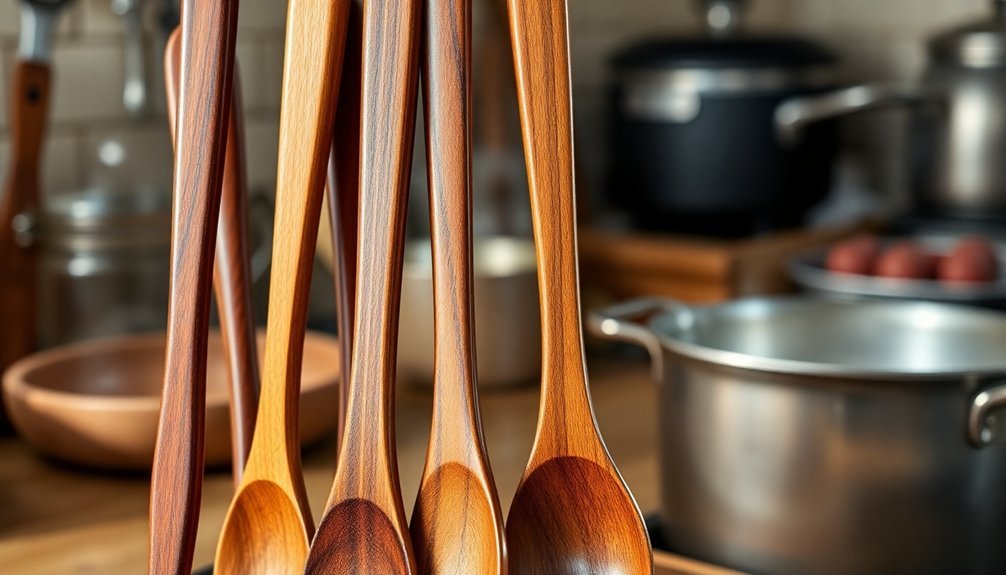
While many kitchen tools have evolved with modern materials, wooden long-handled spoons remain unrivaled for their exceptional heat resistance. You'll immediately notice the difference when stirring hot soups or sauces – your wooden spoon stays cool to the touch, thanks to wood's natural insulation properties.
Hardwoods like teak, olive wood, and cherry excel in this regard. They won't warp, melt, or transfer unwanted heat to your hands during cooking. Their non-reactive nature also guarantees no metallic flavors leach into your carefully prepared dishes. The beautiful olive wood spoon available for just $5.99 exemplifies this perfect combination of functionality and non-reactive properties.
With proper care, these heat-resistant tools become kitchen companions for years. The thermal resistance doesn't diminish over time, making wooden spoons a practical investment that combines traditional craftsmanship with unmatched functional benefits in high-temperature cooking environments.
Artisanal Craftsmanship: Balancing Form and Function in Soap Making
When hand-crafting wooden spoons for soap making, you'll want to select tools with grain that runs parallel to the handle for maximum strength during the stirring process.
The direction of the wood grain isn't merely aesthetic—it directly impacts how effectively your spoon will hold up against the resistance of thick soap mixtures during both cold and hot process methods.
Your choice of a properly crafted long-handled wooden spoon with appropriate grain orientation will make stirring dense soap batters markedly easier while extending the tool's lifespan through countless batches. Traditional soap makers have historically preferred wooden utensils because they provide excellent control during the crucial saponification process when oils and lye combine.
Grain Direction Matters
The structural integrity of a wooden spoon hinges largely on proper grain direction, a detail often overlooked by casual observers but essential to professional craftspeople.
When you're selecting a wooden spoon for soap making, examine how the grain runs through the handle and bowl.
Straight-grained spoons resist splintering and cracking, particularly important when you're stirring caustic soap ingredients. You'll notice master craftsmen align the grain with the spoon's function—running parallel to the handle for strength and curving naturally with the bowl for durability. Hand-washing is recommended to preserve the natural grain pattern and extend the lifespan of your wooden utensils.
Beyond practical concerns, proper grain alignment creates visually appealing patterns that enhance the spoon's aesthetic value.
It's this attention to seemingly minor details that distinguishes truly artisanal wooden utensils from mass-produced alternatives, ensuring your soap making tools remain safe and beautiful for years.
Stirring Thick Mixtures
Stirring thick mixtures demands both proper technique and appropriate tools, especially in the artisanal world of soap making where caustic ingredients pose unique challenges.
While wooden long-handled spoons offer ergonomic benefits and aesthetic appeal, you'll notice they're rarely used with lye-based soap mixtures due to chemical reactivity concerns.
When working with dense concoctions, consider these essential factors:
- Handle length – Longer handles provide better leverage and keep your hands safely away from hot or caustic materials.
- Material compatibility – Stainless steel or plastic tools resist chemical reactions better than wood when working with lye.
- Ergonomic design – A properly crafted handle reduces wrist strain during extended stirring sessions.
Vintage wooden spoons with 32 inches long handles are particularly valuable for traditional large kettle cooking applications, allowing safe distance from heat while maintaining control.
For traditional cooking applications, handcrafted wooden spoons remain unmatched in versatility and craftsmanship, though soap making requires more chemically compatible alternatives.
Why Extended Handles Matter When Working With Hot Lye Solutions
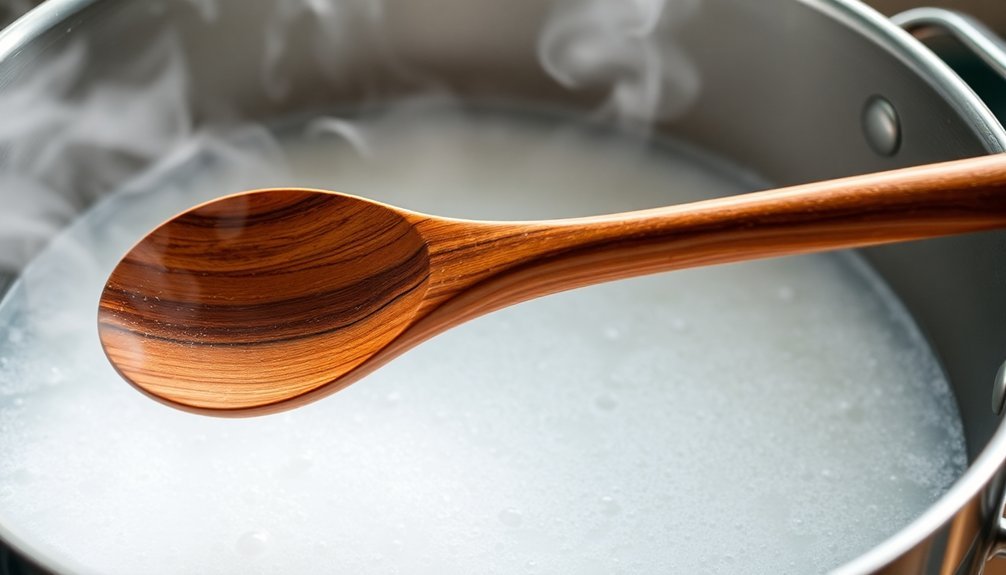
Safety concerns alone justify the use of extended handles when working with hot lye solutions during soap making.
You'll want to keep your hands as far away as possible from these caustic substances, which can cause severe burns on contact.
However, while extended handles provide essential distance, it's vital to understand that wooden spoons aren't appropriate for lye solutions.
The lye breaks down wood's cellular structure, causing degradation and potential contamination of your soap with dangerous splinters.
Instead, opt for stainless steel tools with extended handles when working with lye.
These provide the same distance benefit while resisting chemical reactions.
The long handles provide excellent accessibility to deep containers without you needing to dip your hands near dangerous substances.
The extended reach also allows you to mix thoroughly in deep containers without exposing yourself to harmful fumes or splashes, enhancing both your safety and soap-making efficiency.
Selecting Sustainable Woods for Traditional Soap Crafting
While stainless steel tools are necessary for handling caustic lye solutions, traditional soap crafting often begins with creating the lye itself—a process where wood selection matters greatly.
Though modern soap makers rely on metal tools, ancestral wisdom teaches us that authentic lye crafting begins with choosing the right wood.
When making your own ash-based lye, hardwood sources like oak and beech yield considerably better results than softwoods.
For sustainable soap crafting, consider these essential wood selections:
- Local hardwoods – Using locally sourced trees reduces your carbon footprint while providing the potent ash needed for effective lye.
- Renewable species – Select woods from sustainable forestry practices to guarantee environmental responsibility.
- Untreated timber – Avoid chemically treated woods that could introduce toxins into your lye solution and finished soap.
This zero-waste approach honors traditional techniques while supporting local economies and guaranteeing your handcrafted soaps remain truly eco-friendly. Long wooden spoons are ideal for the gentle cooking process that transforms your mixture into soft soap with a butterscotch-like appearance.
The Gentle Touch: How Wood Preserves Delicate Soap Textures
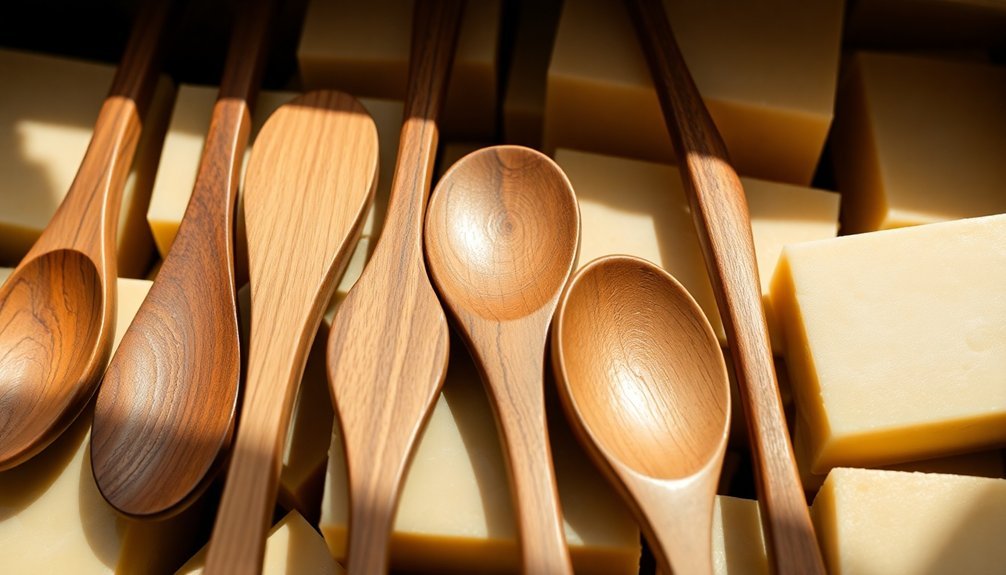
When creating intricate soap designs, you'll find wooden spoons offer the perfect gentle touch for preserving delicate swirls without disrupting your artistic patterns.
The soft material benefits of wood allow you to fold, mix, and sculpt your soap mixtures with minimal damage to fragile textures that metal or plastic utensils might otherwise disturb.
Your temperature-stable wooden spoon won't conduct heat during hot processes, enabling consistent stirring throughout your soap crafting journey without compromising those carefully crafted designs. Crafters particularly appreciate bamboo spoons as they're kinder to pots while being surprisingly strong and lightweight for extended use during soap-making sessions.
Preserving Delicate Swirls
The gentle nature of wooden long-handled spoons makes them the ideal tool for preserving intricate soap designs. When you're crafting those beautiful swirls and patterns, you'll appreciate how wooden spoons offer controlled movement without disrupting your artistic work. They distribute ingredients evenly while their smooth surface prevents scratching your delicate creations.
Your soap swirls stay intact thanks to:
- Non-abrasive contact – Wood doesn't scratch or damage intricate patterns the way metal tools might
- Precision control – The ergonomic long handle gives you better leverage for gentle, deliberate movements
- Even pressure distribution – Wooden spoons naturally spread force across their surface, preventing accidental pattern disruption
Being non-reactive with acidic ingredients, wooden spoons won't leach unwanted flavors or chemicals into your soap mixtures.
You'll find that wooden spoons become an extension of your artistic vision, preserving the integrity of each unique design.
Soft Material Benefits
Wood's inherent softness provides a uniquely gentle touch that metal or plastic alternatives can't match in soap making. When you're handling delicate soap textures and sensitive ingredients, the smooth surface of wooden spoons reduces friction and minimizes damage.
Unlike metal utensils, wooden spoons won't react with your soap ingredients, preventing unwanted discoloration and chemical reactions. You'll appreciate how hardwoods like maple, beech, and cherry preserve the integrity of mica, pigments, and decorative elements without causing breakage or crumbling. The non-damaging to surfaces quality of wooden spoons makes them perfect for preserving both your soap creations and equipment.
The non-scratching texture of wood also protects your soap molds during the mixing process, ensuring smooth removal later. When you're stirring essential oils or fragrances, wood's gentle interaction maintains their potency while providing the perfect balance of firmness and sensitivity for your craft.
Temperature-Stable Stirring
Beyond softness, a wooden spoon's remarkable temperature stability provides critical advantages for artisanal soap making. When you're working with heated oils and lye solutions, wooden long-handled spoons maintain consistent temperatures without conducting heat to your hands, allowing you to focus on perfecting your formulations rather than worrying about burns.
Wood's natural properties make it ideal for soap crafting:
- Heat resistance guarantees your spoon won't warp or release chemicals when stirring hot mixtures.
- Non-conductive qualities keep the handle cool even during extended stirring sessions.
- Even heat distribution prevents hot spots that could alter delicate soap textures.
The non-scratch properties of wooden spoons ensure they won't damage your expensive soap-making equipment while you stir.
Unlike metal utensils that rapidly conduct heat or plastic tools that might melt, wooden spoons create the perfect balance of durability and temperature management for your artisanal creations.
Ergonomic Design Elements That Prevent Stirrer Fatigue
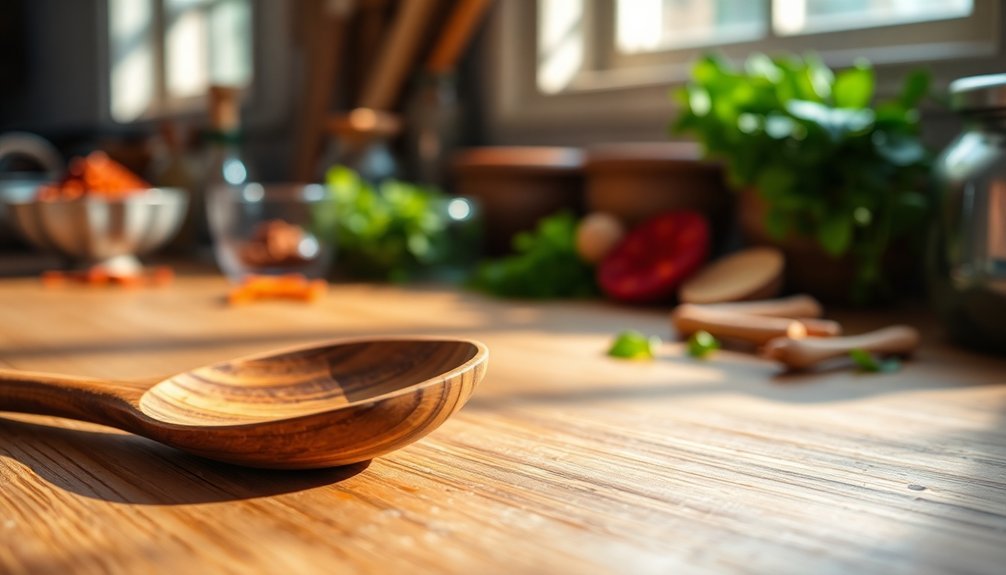
Designed to prevent hand and wrist strain during extended cooking sessions, ergonomic wooden long-handled spoons incorporate several key features that minimize stirrer fatigue. The thoughtful craftsmanship balances weight distribution while providing comfortable grip areas that fit naturally in your hand. Many artisans incorporate a triangular cross-section in their handle designs for improved grip orientation.
| Feature | Benefit |
|---|---|
| Curved handles | Conform to natural hand position |
| Triangular grips | Prevent rotation during stirring |
| Polished finishes | Eliminate friction and splinters |
| Balanced weight | Reduces wrist strain during use |
| Extended length | Keeps hands away from heat sources |
You'll appreciate how these elements work together—the angled spoon heads improve leverage while stirring thick mixtures, and the carefully shaped handles distribute pressure evenly across your palm. These ergonomic considerations guarantee you can maintain control throughout long cooking sessions without discomfort.
Natural Properties That Resist Corrosion From Caustic Ingredients
While many cooking utensils deteriorate when exposed to acidic tomatoes or caustic vinegar, wooden long-handled spoons possess remarkable chemical resistance properties.
Unlike metal alternatives that can react with acids and impart metallic flavors, wood remains chemically neutral regardless of what you're cooking.
You'll appreciate these key benefits:
- Wood doesn't react chemically with acidic foods like citrus, tomatoes, or vinegar-based sauces.
- Dense hardwoods such as maple, beech, and walnut offer superior resistance to harsh ingredients.
- The natural composition prevents the leaching of harmful substances into your food, unlike some synthetic materials.
This chemical neutrality means you'll never worry about your spoon contaminating delicate flavors or deteriorating when stirring caustic ingredients, making wooden spoons ideal for virtually any culinary application. Wooden spoons are particularly valued for their naturally non-reactive properties, ensuring the authentic taste of your dishes remains uncompromised.
From Tree to Tool: The Meticulous Creation Process of Master Spoon Carvers
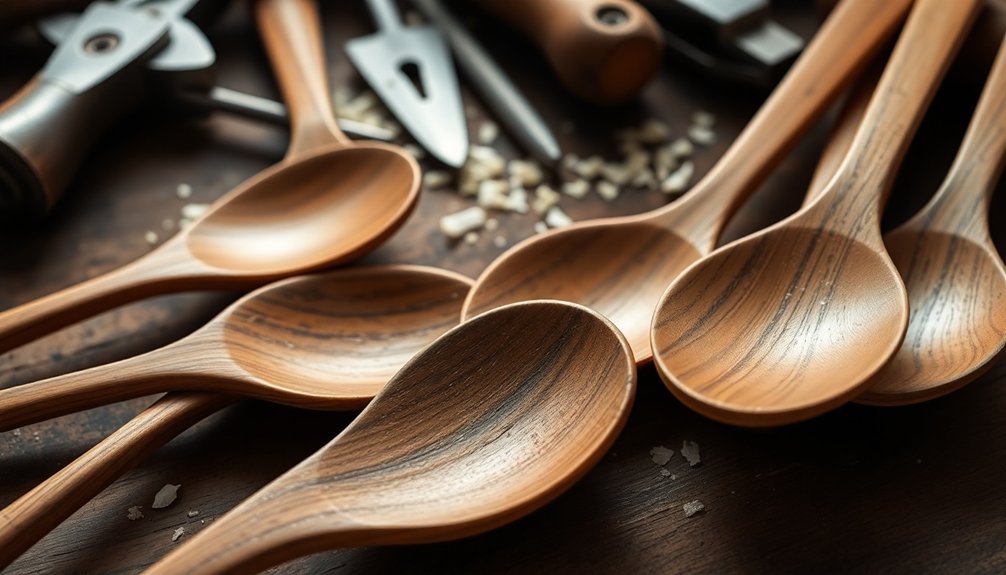
The journey from raw timber to exquisite wooden spoon begins with the master carver's discerning eye for selecting the perfect material.
In the hands of a master, every wooden spoon begins as a whisper of potential within carefully chosen timber.
You'll find that hardwoods like ash, cherry, and walnut are preferred for their durability, with knot-free sections being essential to prevent future cracking.
After selecting wood (typically 1/2" to 3/4" thick), carvers begin with preliminary cuts using axes or hatchets.
They'll then employ specialized tools—gouges, drawknives, and hook knives—to shape the form.
Traditional methods often involve working with green wood, which is more pliable but requires drying time.
The handle is carefully shaped for ergonomics while the bowl is excavated using specialized spoon knives.
Finally, progressive sanding from coarse to fine grits and finishing with natural oils transforms the wood into a functional work of art.
Many artisans follow the principle of carving the scoop first before cutting the overall shape of the spoon.
Frequently Asked Questions
Can Wooden Spoons Be Sterilized for Commercial Soap Production?
Yes, you can sterilize wooden spoons for commercial soap production using saltwater boiling, vinegar soaks, or hydrogen peroxide. However, you'll need regular maintenance and proper drying to prevent cracking and guarantee hygiene standards.
How Do Different Wood Types Affect Soap Color or Fragrance?
Different woods impact your soap's appearance and scent distinctly. Cedar and sandalwood impart unique hues as colorants, while their essential oils create earthy fragrances. Hardwood ash can affect both color and pH balance.
What's the Ideal Handle Length for Large Batch Soap Making?
For large batch soap making, you'll want a handle length of 18-24 inches. This keeps your hands safely away from hot lye mixtures while giving you enough leverage to stir thick soap batches effectively.
Can Wooden Spoons Be Used With Cold Process and Hot Process Methods?
You can use wooden spoons for cold process soapmaking, but they'll gradually deteriorate from lye exposure. For hot process, they're less suitable due to heat and stronger chemical interactions. Consider silicone or stainless steel alternatives instead.
How Often Should Wooden Soap-Making Tools Be Replaced?
You'll need to replace wooden soap-making tools every 1-2 years with frequent use. However, with proper maintenance—regular cleaning, oiling, and avoiding prolonged lye exposure—they can last 3-5 years or longer.
In Summary
In choosing a wooden long-handled spoon, you're embracing centuries of wisdom. You'll feel the difference immediately—the perfect balance, comfortable grip, and protection from heat and chemicals. Your craft deserves tools created with the same care you put into your soap. When you hold a master craftsman's wooden spoon, you're not just stirring ingredients; you're continuing a tradition of excellence.
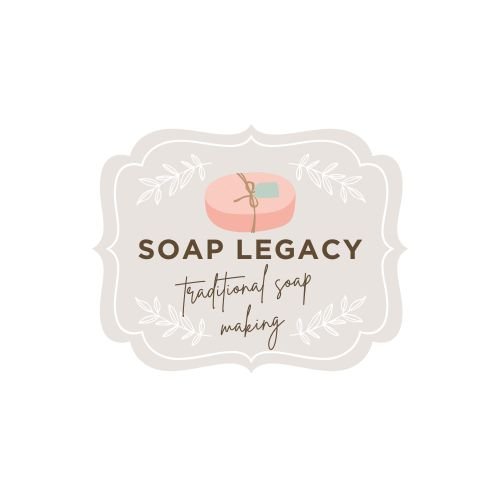
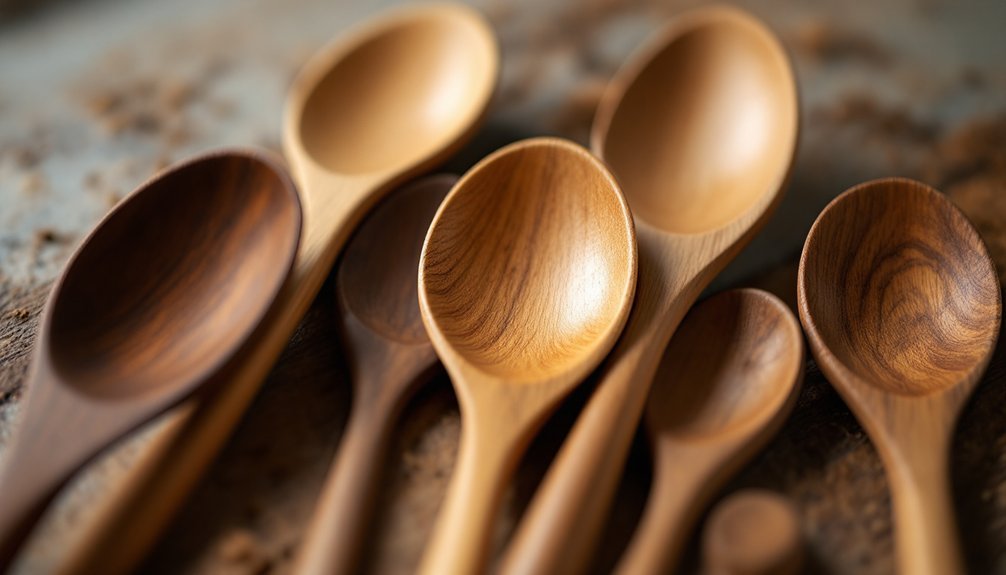
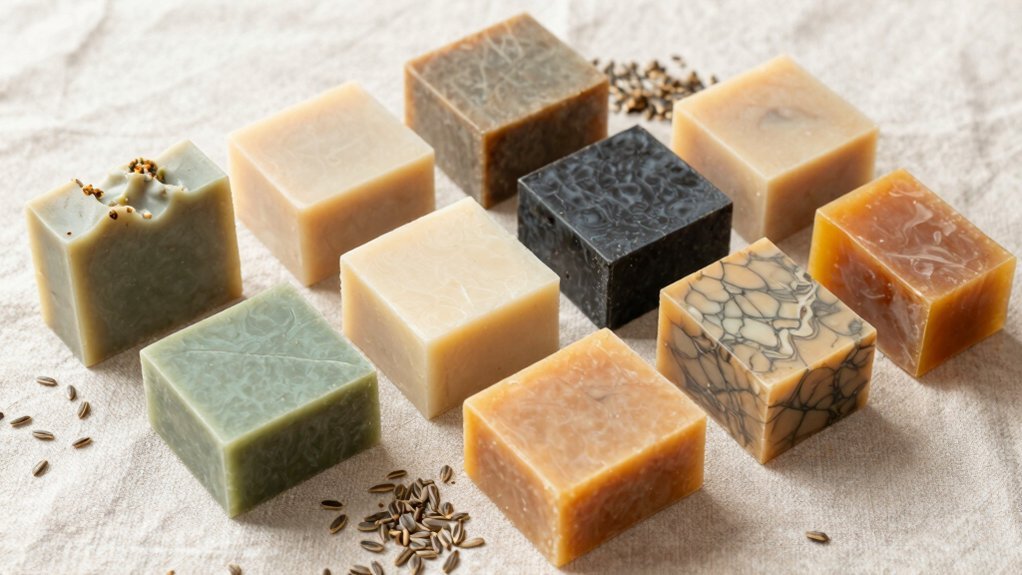
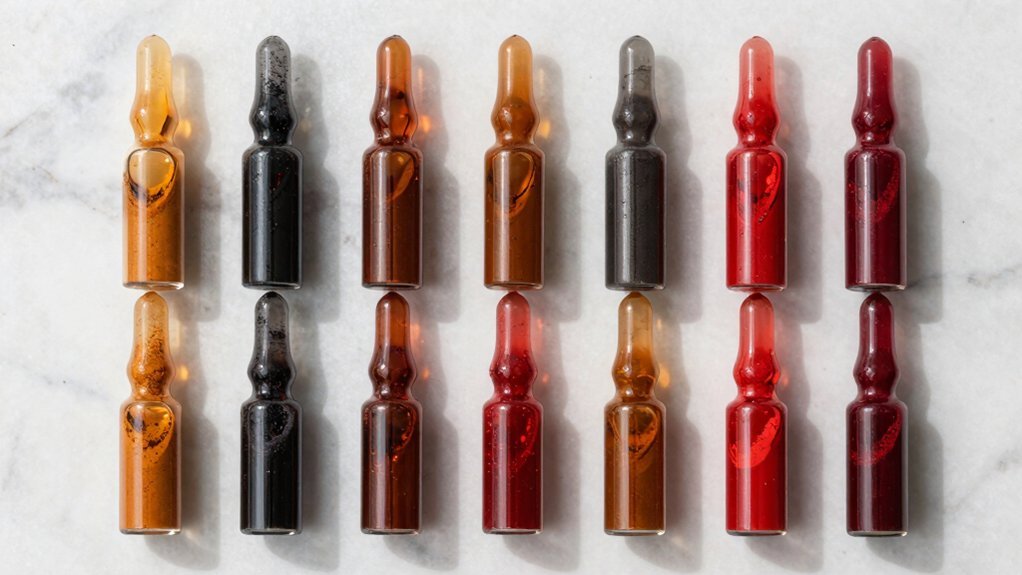
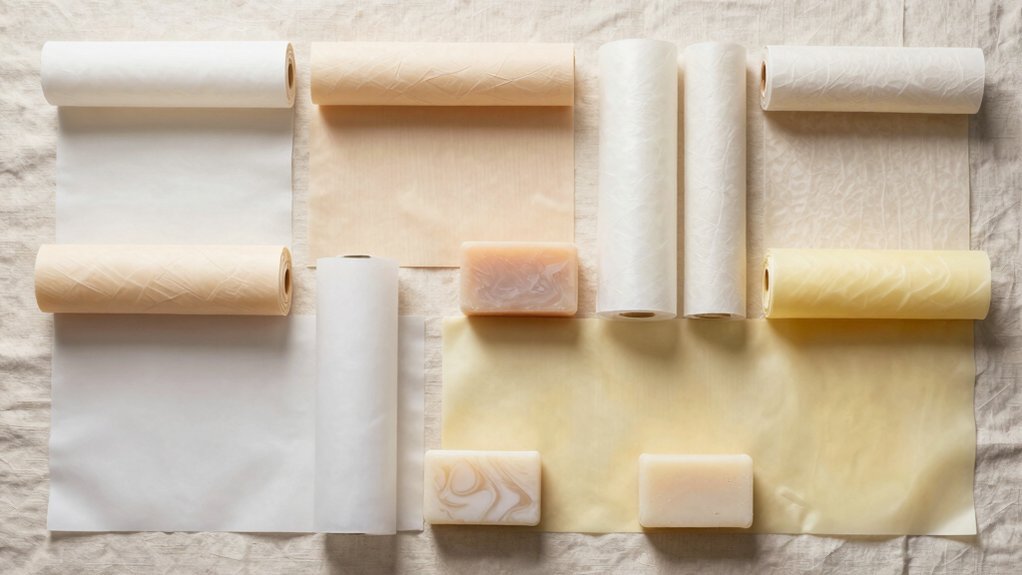
Leave a Reply